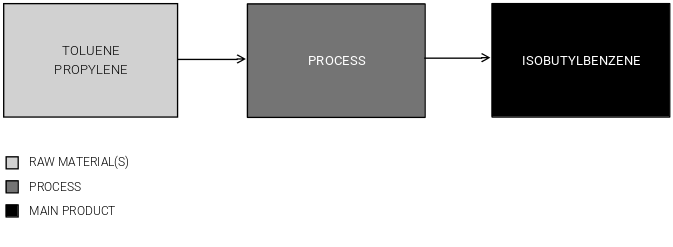Commodity Production Costs Report
Isobutylbenzene Production from Toluene and Propylene
Isobutylbenzene Operating Costs & Plant Construction Costs
This report presents the economics of Isobutylbenzene (IBB) production from toluene and propylene based on an industrial plant located in the United States. In this process, toluene is reacted with propylene in the presence of a sodium/potassium alloy (NaK2) catalyst. A mixture of isobutylbenzene (IBB) and n-butylbenzene (NBB) are produced with IBB predominating.
The report provides a comprehensive study of Isobutylbenzene production and related Isobutylbenzene production cost, covering three key aspects: a complete description of the Isobutylbenzene production process examined; an in-depth analysis of the related Isobutylbenzene plant capital cost (Capex); and an evaluation of the respective Isobutylbenzene plant operating costs (Opex).
The Isobutylbenzene production process description includes a block flow diagram (BFD), an overview of the industrial site installations, detailing both the process unit and the necessary infrastructure, process consumption figures and comprehensive process flow diagrams (PFD). The Isobutylbenzene plant capital cost analysis breaks down the Capex by plant cost (i.e., ISBL, OSBL and Contingency); owner's cost; working capital; and costs incurred during industrial plant commissioning and start-up. The Isobutylbenzene plant operating costs analysis covers operating expenses, including variable costs like raw materials and utilities, and fixed costs such as maintenance, labor, and depreciation.
Key reference(s): ?

Product
Isobutylbenzene. Isobutylbenzene is an aromatic hydrocarbon used as an intermediate in the production of pharmaceuticals and chemicals. It is synthesized from isobutylene and benzene. Its primary use is in the synthesis of ibuprofen.
Raw Materials
Propylene. Propylene, the main raw material consumed, is a colorless gas at room temperature. It is a low-boiling, flammable, and highly volatile gas, with molecular formula C3H6. Propylene reacts vigorously with oxidizing materials. It may be mildly irritating to the nose, throat, and respiratory tract; propylene has low acute toxicity from inhalation. PG Propylene has been mainly produced as ethylene manufacturing co-product (via steam cracking of paraffinic hydrocarbons) and by-product of petroleum refining (separation from refinery gas). Most recently, amid a tight propylene market, new and novel lower-cost chemical processes for on-purpose propylene production have emerged.
Toluene. Toluene (also known as Methylbenzene) is an aromatic hydrocarbon mainly used as an industrial feedstock and as solvent. A significant part of toluene production is blended directly into gasoline pools. Other major use of this chemical is in the manufacture of the more valuable benzene, through hydrodealkylation. Most of toluene is produced via catalytic reforming of refinery streams (C6–C9 naphthas), along with benzene, xylenes, and C9-aromatics.
Report in PDF Format
Download & Explore Anytime
Access in Various Devices
Print & Read Comfortably
Share With Co-workers
Up-to-date Report
Professional report based on Q3 2024 economic data, ensuring timely evaluations.
Multiple Use Cases
Ideal for investment screening, feasibility studies, cost estimates, and research planning.
Proven Methodology
Developed using a consistent methodology honed over a decade, ensuring reliable cost analyses.
Report Editions
Content Highlights
Plant Capital Cost Summary
Summary outlining the capital cost required for building the Isobutylbenzene production plant examined.
Plant Capital Cost Details
Detailing of fixed capital (ISBL, OSBL & Owner’s Cost), working capital and additional capital requirements.
Plant Cost Breakdowns
Breakdown of Isobutylbenzene process unit (ISBL) costs and infrastructure (OSBL) costs; plant cost breakdown per discipline.
Operating Costs Summary
Summary presenting the operating variable costs and the total operating cost of the Isobutylbenzene production plant studied.
Operating Cost Details
Detailing of utilities costs, operating fixed costs and depreciation.
Plant Capacity Assessment
Comparative analysis of capital investment and operating costs for different Isobutylbenzene plant capacities.
Production Process Information
Block Flow Diagram, descriptions of process unit (ISBL) and site infrastructure (OSBL).
Process Consumptions
Raw materials and utilities consumption figures, by-products credits, labor requirements
Process Diagrams
Process flow diagrams (PFD), equipment list and industrial site configuration
Could Not Find the Report You Need?
Obtain a Bespoke Report
Get a report targeting the process in which you are interested
See Offer Details
Understand Bespoke Reports and how you can easily order them
Check Editions & Pricing
Complete a brief form and see a quotation for your Bespoke Report
Other Related Production Cost Reports

Propylene Production from Propane (Moving-Bed Reactor)
This study presents the economics of Polymer Grade (PG) Propylene production from propane. The process consists in the dehydrogenation of propane, carried out in a moving-bed reactor, similar to UOP Oleflex. The economic analysis performed assumes a plant located in the United States.
Details: 550 kta United States-based plant | Q3 2024 | 107 pages | Issue B | From $799 USD

Toluene Production from Pygas
This study presents the economics of Toluene production from pyrolysis gasoline (pygas) in the United States using a typical liquid-liquid extraction process.
Details: 400 kta United States-based plant | Q3 2024 | 107 pages | Issue B | From $799 USD

Propylene Production from Ethylene and Butenes
This report presents the economics of Polymer Grade (PG) Propylene production from ethylene and raffinate-2. The process under analysis consists in a metathesis process similar to Lummus Technology's Olefins Conversion Technology (OCT). The economic analysis performed assumes a plant located in the United States.
Details: 350 kta United States-based plant | Q3 2024 | 107 pages | Issue A | From $799 USD

Toluene Production from Reformate
This report presents the economics of Toluene production from reformate. The reformate is submitted to a typical sulfolane liquid-liquid extraction, giving a mixture of aromatics, which is further processed to yield pure Toluene. Benzene and mixed xylenes are produced as by-products. The economic analysis presented is based on a plant constructed in the United States.
Details: 350 kta United States-based plant | Q3 2024 | 107 pages | Issue A | From $799 USD
+800 Reports Developed, Targeting +250 Commodities
Vast Report Library
858 independent and up-to-date reports examining embryonic and established production processes.
Free Sample Reports
Quickly understand the structure and depth of content of our professional reports.

